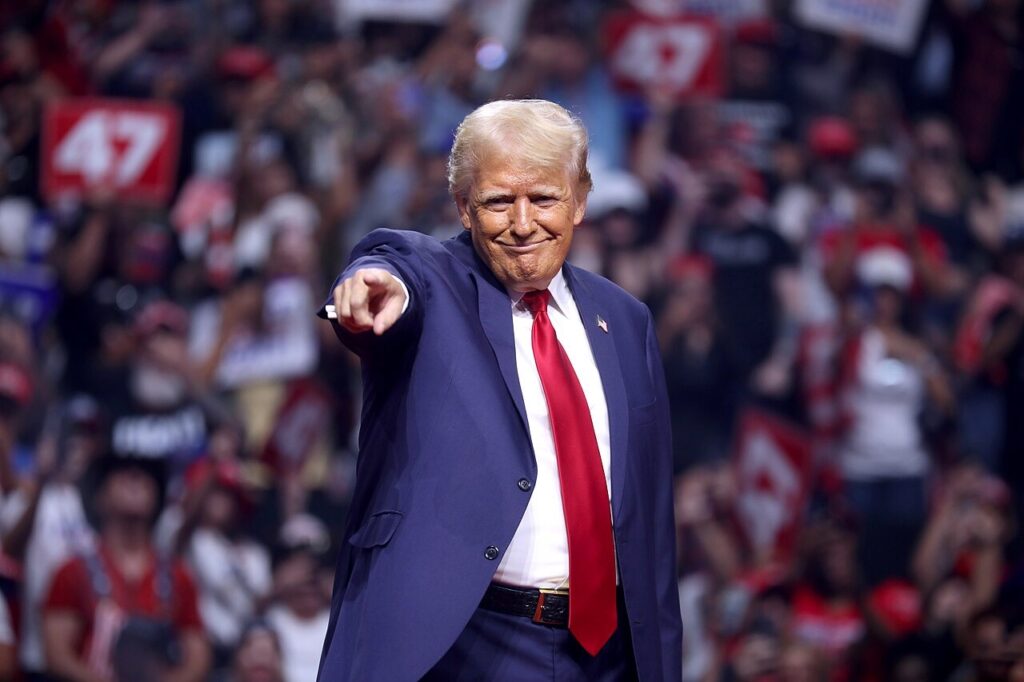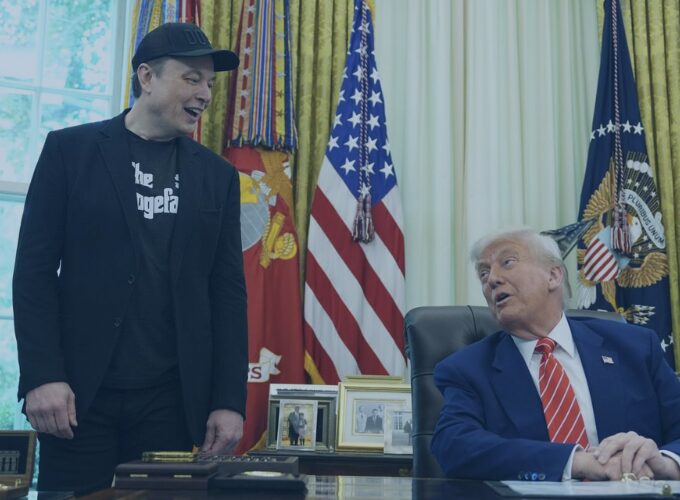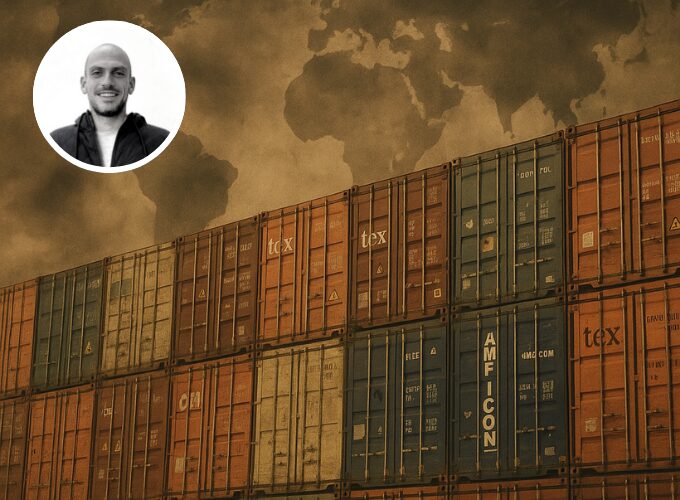Donald Trump has an uncanny ability to smash through sacred cows and somehow come out standing. Whether by instinct or calculation, he tends to do what others consider unthinkable—and then forces everyone else to reckon with the fallout. His latest promise to impose steep tariffs on foreign goods is no exception. It’s a move that many economists, politicians and trade experts see as reckless, inflationary, and self-defeating. But for all the noise around the economic risks, there’s something more interesting at play beneath the surface: what if, whether by accident or intent, Trump is opening the door to a long-overdue reset of the global economic order?
For decades, critics have argued that globalisation—at least in the form we’ve known it—has constrained our ability to imagine or implement alternative economic systems. Countries may be technically sovereign, but their room for manoeuvre is sharply limited by the need to remain competitive in global markets. Try to tax capital and it flees. Try to increase worker protections and you’re punished with higher costs. Try to pursue a green industrial plan and you find yourself undercut by carbon-intensive imports. In this system, politics is real only insofar as it obeys the logic of global markets. Everything else is theory.
Trump, either knowingly or not, is throwing a wrench into this logic. By reintroducing barriers to trade and threatening to unravel the open flows of goods and capital that have defined the post-Cold War era, he is attacking not just specific trade deals, but the architecture of globalisation itself. It may not be elegant, and it may not be coherent, but the effect could be transformative.
Let’s entertain the possibilities. In one scenario—the more cautious one—Trump’s tariffs cause short-term economic pain. Consumers face rising prices. Global supply chains are disrupted. Allies are angered. But eventually, elections shift the political landscape. Cooler heads prevail. Trade talks resume. Tariffs are lifted or reshaped. The system proves resilient. Maybe it emerges battered, but intact. Call it globalisation 2.1: a patched-up version of the existing order, complete with new leaders, revised frameworks, and a renewed commitment to integration. The world breathes a sigh of relief and moves on.
But what if that’s not how it plays out?
What if the shocks compound rather than resolve? What if tit-for-tat tariffs evolve into more permanent fractures? What if other powers—China, the EU, blocs in the Global South—begin to internalise the lesson that the US no longer guarantees, or even believes in, an open system? Supply chains could decouple not temporarily, but permanently. Strategic sectors might be nationalised or ringfenced. Investment patterns could shift, not toward efficiency, but toward resilience and control. The result wouldn’t be chaos, but a steady, grinding reconfiguration of the world economy. And underneath it all, a deeper shift: the idea that globalisation is no longer the default.
This wouldn’t necessarily mean a full return to protectionism or economic self-sufficiency. Trade wouldn’t disappear. But its role would change. Instead of being the organising principle of global affairs, it would become one tool among many—used selectively, in line with domestic priorities. Countries might decide that it’s better to grow slightly slower, but with more control. That redundancy in supply chains is preferable to absolute efficiency. That it’s acceptable, even desirable, to pay a bit more for goods if it means keeping industries—and jobs—closer to home.

Crucially, such a shift would also change the relationship between economics and politics. For the first time in decades, governments might have the space to genuinely choose how their economies function. Not just within the narrow limits imposed by trade competitiveness but based on broader values. They could pursue green transitions, tax reform, or even forms of social democracy without fear of immediate punishment by markets or multinationals. Global capital would still exist, of course—but its ability to veto domestic policy would be weakened.
None of this is guaranteed, and much of it could go badly wrong. The transition could be painful, especially for poorer countries that depend on access to Western markets, or for consumers accustomed to cheap imports. Inflationary pressures could spiral. Strategic miscalculations could trigger further instability. And there’s no guarantee that the alternative models that emerge will be more democratic or humane.
But the current model isn’t exactly working either. For all the growth it has delivered, globalisation has also produced deep inequality, ecological destruction, and a fragile interdependence that leaves nations vulnerable to shocks beyond their control. It has eroded public faith in institutions, narrowed the space for political imagination, and rewarded a class of global elites that often have little stake in the wellbeing of any one country. If this is what stability looks like, it’s no wonder people are willing to take risks.
Which brings us back to Trump. It’s entirely possible that he’s doing the wrong thing for the wrong reasons. His view of trade is transactional, even simplistic. He sees deficits as losses, allies as freeloaders, and tariffs as punishments. But outcomes don’t always depend on intentions. By disrupting the system—intentionally or otherwise—he may be creating the conditions for something new. And if that something new is a more balanced, more pluralistic global economy, then even those who oppose him politically might find reason to welcome the moment.
There’s a tendency to view this era of economic turbulence as a detour—an interruption to be corrected before we return to the trajectory we were on. But perhaps it’s not a detour at all. Perhaps it’s the start of a new road. One where trade is measured not just by GDP growth but by its impact on communities, environments, and sovereignty. One where countries can experiment, succeed, fail, and adapt without being punished for stepping out of line.
Thirty years from now, we may look back at this period not as a catastrophe, but as a turning point. Not because Trump had the answers, but because his disruption forced everyone else to start asking better questions.
You Might Also Like

Latest Article
Palantir Executive Says Company Is ‘Building the Next AWS’ As It Expands Commercial Push
Palantir Technologies is positioning itself as the foundational infrastructure for future enterprise AI development, with one senior executive claiming the company is “building the next AWS.” The comment came from Ted Mabrey, Palantir’s Global Head of Commercial, who took to X on Tuesday to argue that Palantir has already solved many of the complex … Continued
|
2 July 2025
Written by MeetInc.

US Job Openings Highest Since November But Manufacturing Shrinks For Fourth Month
|
2 July 2025
Written by MeetInc.

Trump Escalates Feud With Elon Musk And Says DOGE Could ‘Eat’ Tesla Boss
|
2 July 2025
Written by MeetInc.











